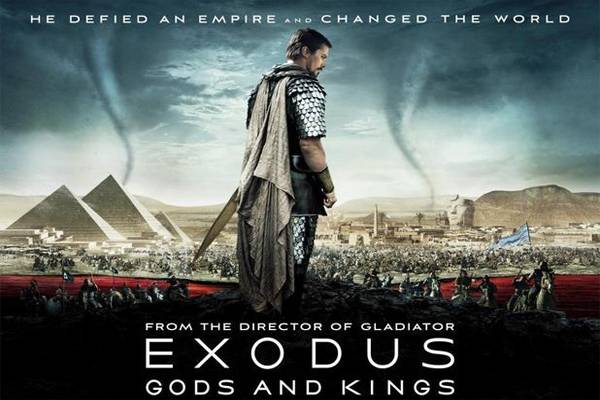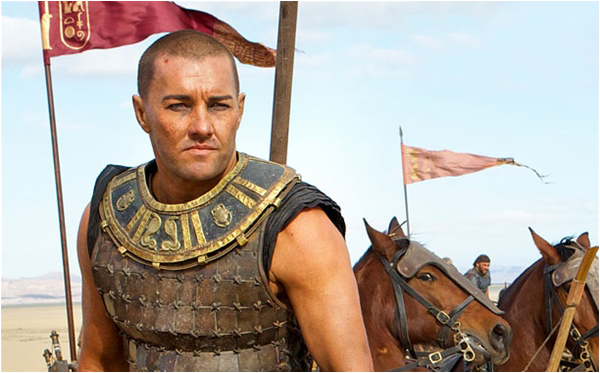
The fact that Ridley Scott set a film in Ancient Egypt casting only Caucasians in leading roles is admittedly a sad reflection of what flies in mainstream American cinema, but let me tell you right now, while Exodus may have provided a few non-white actors with some exposure and a paycheck, this film was never going to be the highlight of anyone’s CV. I’m sure the cast – John Turturro, Joel Edgerton, Sigourney Weaver, Ben Kingsley, Aaron Paul, and Christian Bale as Moses – don’t especially wish to be remembered for it, and nor are they likely to be.
Exodus, with its clunky subtitle (“Gods and Kings”), is based on the Biblical story of Moses leading the Israelites out of Pharaonic slavery and into the Promised Land of Canaan. Moses, raised as an Egyptian prince and potentially Seti I’s successor, learns his true origins as an Israelite, rejects the family who brought him up, along with all the perks of royalty. Exiled to the desert, and facing almost certain death, he returns to defy the world’s most powerful empire, frees his people from slavery and inspires a movement that radically alters history. He parts the Red Sea for heaven’s sake – it should by all means be an absolutely thrilling, emotional rollercoaster of a cinematic experience – as it was in the able hands of Cecil B DeMille in 1956. Under Ridley Scott’s direction, however, it’s a strangely cold and cumbersome affair.
There are so many things wrong with Exodus, it really is easier to list the aspects that didn’t offend. While John Turturro sounds like the world’s most unlikely casting choice for Seti I, he has presence and dignity and one is able to share his concern regarding his jackass of a son Ramses inheriting his throne and his unbridled power. I suppose the costumes are OK, the Hittites have snazzy headgear in their one battle scene, the CGI locusts are rather fun, and when Moses and Zipporah get married, they live in a desert dwelling with an elegant Marrakesh-style Homes-and-Gardens interior.
That aside, the lasting impression Ridley Scott’s Exodus leaves one with is that of laziness. It’s as if he’s decided that because the story is so familiar, he shall spare himself the trouble of retelling it engagingly. Christian Bale is pretty much the Dark Knight all over again. Instead of seeing individuals and families suffering at the hands of Egyptian slave-drivers, people we can relate to and feel for, people whose names we know and whose dreams we understand, one gets a general and somewhat distant sense of wretchedness without any real emotional connection to anyone. General wretchedness isn’t nearly enough for an age as inured as ours to on-screen slaughter (if you can shrug off Game of Thrones, then a few random hangings and a bit of lashing is unlikely to shake you to the core). Violence is just dull without anyone taking the trouble of humanizing the victims. When Edgerton’s Ramses loses his young son and Scott gives us a funeral scene for a child, it fails to move, as he hasn’t put the legwork into the father-son relationship to begin with. The scene thus merely consists of an unsympathetic Ramses mourning a kid we never knew who, when mummified, looks like an ancient Egyptian Telly Tubby.

Even Ben Kingsley as Nun, the slave who tells Moses about his true origins, isn’t especially convincing, in spite of his gravitas autopilot. The mere act of casting Kingsley isn’t the same as providing him with decent dialogue or scenes that live and breathe. The same goes for Sigourney Weaver playing Ramses’ mother. She floats about in a few scenes with no dialogue like an extra, and then disappears altogether after delivering a line or so. Her main function in this film seems to be that of reminding viewers that she and Scott made a classic called Alien once and that they’re both capable of far more than this.
Still, the film’s single biggest flaw is Scott’s desire to provide rational explanations for the wonders described in the Old Testament. If Bale’s Moses is indeed a man who can save vast numbers of people from oppression and persecution and inspire them to follow him across a treacherous landscape to freedom without divine intervention, then we see no evidence of this. Adding rationalist touches like having Moses bump his head before his vision of the Burning Bush, and trying to explain the plague of locusts, the rain of frogs and the parting of the Red Sea as natural phenomena means one is left with absolutely nothing in the end – neither a plot that makes any sense without the existence of a higher power, nor a moving, awe-inspiring epic as intended by the Bible.
Faiza Sultan Khan is a former features editor of The Friday Times
Exodus, with its clunky subtitle (“Gods and Kings”), is based on the Biblical story of Moses leading the Israelites out of Pharaonic slavery and into the Promised Land of Canaan. Moses, raised as an Egyptian prince and potentially Seti I’s successor, learns his true origins as an Israelite, rejects the family who brought him up, along with all the perks of royalty. Exiled to the desert, and facing almost certain death, he returns to defy the world’s most powerful empire, frees his people from slavery and inspires a movement that radically alters history. He parts the Red Sea for heaven’s sake – it should by all means be an absolutely thrilling, emotional rollercoaster of a cinematic experience – as it was in the able hands of Cecil B DeMille in 1956. Under Ridley Scott’s direction, however, it’s a strangely cold and cumbersome affair.
There are so many things wrong with Exodus, it really is easier to list the aspects that didn’t offend. While John Turturro sounds like the world’s most unlikely casting choice for Seti I, he has presence and dignity and one is able to share his concern regarding his jackass of a son Ramses inheriting his throne and his unbridled power. I suppose the costumes are OK, the Hittites have snazzy headgear in their one battle scene, the CGI locusts are rather fun, and when Moses and Zipporah get married, they live in a desert dwelling with an elegant Marrakesh-style Homes-and-Gardens interior.
Christian Bale is pretty much the Dark Knight all over again
That aside, the lasting impression Ridley Scott’s Exodus leaves one with is that of laziness. It’s as if he’s decided that because the story is so familiar, he shall spare himself the trouble of retelling it engagingly. Christian Bale is pretty much the Dark Knight all over again. Instead of seeing individuals and families suffering at the hands of Egyptian slave-drivers, people we can relate to and feel for, people whose names we know and whose dreams we understand, one gets a general and somewhat distant sense of wretchedness without any real emotional connection to anyone. General wretchedness isn’t nearly enough for an age as inured as ours to on-screen slaughter (if you can shrug off Game of Thrones, then a few random hangings and a bit of lashing is unlikely to shake you to the core). Violence is just dull without anyone taking the trouble of humanizing the victims. When Edgerton’s Ramses loses his young son and Scott gives us a funeral scene for a child, it fails to move, as he hasn’t put the legwork into the father-son relationship to begin with. The scene thus merely consists of an unsympathetic Ramses mourning a kid we never knew who, when mummified, looks like an ancient Egyptian Telly Tubby.

Even Ben Kingsley as Nun, the slave who tells Moses about his true origins, isn’t especially convincing, in spite of his gravitas autopilot. The mere act of casting Kingsley isn’t the same as providing him with decent dialogue or scenes that live and breathe. The same goes for Sigourney Weaver playing Ramses’ mother. She floats about in a few scenes with no dialogue like an extra, and then disappears altogether after delivering a line or so. Her main function in this film seems to be that of reminding viewers that she and Scott made a classic called Alien once and that they’re both capable of far more than this.
Still, the film’s single biggest flaw is Scott’s desire to provide rational explanations for the wonders described in the Old Testament. If Bale’s Moses is indeed a man who can save vast numbers of people from oppression and persecution and inspire them to follow him across a treacherous landscape to freedom without divine intervention, then we see no evidence of this. Adding rationalist touches like having Moses bump his head before his vision of the Burning Bush, and trying to explain the plague of locusts, the rain of frogs and the parting of the Red Sea as natural phenomena means one is left with absolutely nothing in the end – neither a plot that makes any sense without the existence of a higher power, nor a moving, awe-inspiring epic as intended by the Bible.
Faiza Sultan Khan is a former features editor of The Friday Times

